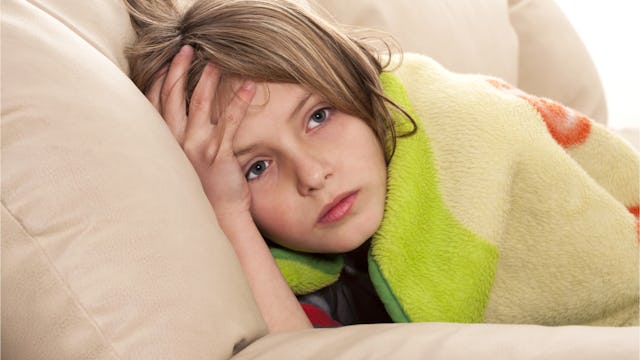Childhood Migraines Are The Worst, But They Are (Unfortunately) Not Uncommon

As anyone who has ever suffered from a migraine knows, migraines are more than just a headache. Sometimes, it doesn’t even seem fair to put them in the same category, really. Migraines can punish you for days, and leave you feeling powerless and unable to function in your normal life.
For me, I get bad visual migraines. The headache isn’t terrible, but the visual tricks my eyes play on me are downright freaky. They started when I was pregnant with my first child and happen every once in a while when I am stressed, worn-out, or dehydrated.
But what I didn’t expect was to have a child with migraines. There is nothing worse than watching your child suffer, and while migraines suck as an adult, childhood migraines are the worst. Watching your child missing out on life, and in pain, because of a migraine truly sucks.
Recently, my middle child woke up and told me his head hurt. Within an hour, he was hanging over the toilet unable to keep his ibuprofen in his tummy because the pain was so intense. A few hours later he was fine, his headache was gone, and he was back to himself. But he missed his field day during the last week of school, and it broke my heart that it was all because of a migraine.
According to the Migraine Research Foundation, an astounding 10% of kids suffer from migraines, and it is considered one of the top 10 most debilitating illnesses in the world. That’s because migraines are not just about head pain. While the pain is intense, they can also cause a myriad of other debilitating symptoms like nausea, vomiting, sensitivity to light and sound, dizziness, and visual problems.
When kids have chronic migraines, they miss about twice as much school as other kids, and if you have migraines, there is a 50% chance your kid(s) will too, according to the Migraine Research Foundation.
So it’s kind of a big deal to have a kid who suffers from migraines, and figuring out how to catch the migraine before it starts can help. NBC News recently reported on a new study that has shown that kids who suffer from migraines almost always have two warning signs up to 24 hours before the migraine starts. The warning signs are extreme fatigue and moodiness.
While most parents know that all kids can get overly tired and moody at literally any moment, for those of us who have kids suffering from migraines, we can be proactive in doing something before it starts when we see these signs in our kids. Early intervention can often lessen or eliminate the migraine all together.
If a migraine hits, always consult your child’s doctor first, but here are a few mom tips for helping your child cope.
Have your child lie down in a cool dark room. Think about letting your child wear sunglasses inside if that makes them more comfortable.
If your child is sensitive to sound, think about headphones with some white noise, or turning on a white noise machine in their room while they rest.
Sometimes a heat pack on the neck and shoulders can help ease tension, while an icepack on the point of pain on the head can help too. Even a cold washcloth eases the discomfort.
If you’re waiting for the medicine to kick in, see if you can get your child to take little sips of Gatorade, or Powerade, in the mean time. Some parents suggest that caffeine helps, but for other kids, caffeine can actually trigger migraines. The key is to try to keep your child hydrated.
Some parents suggest that the combo of Benadryl and pain meds like ibuprofen have worked magic in their kids and are often the combination of meds administered when you end up in the emergency room. (Of course, consult your child’s doctor first.)
If your child is a migraine sufferer, don’t hesitate to give them pain meds as soon as they complain. My pediatrician recommended that the sooner you can start pain meds, the better the outcome, and I’ve found this to be absolutely true.
Sometimes, the best thing you can do as a parent is just to be there for your kid, to empathize and offer comfort, when they are suffering. Let’s face it, even adults want their moms when they are sick because no one can make you feel better quite like your mom can. And sometimes that’s the best medicine of all.
This article was originally published on